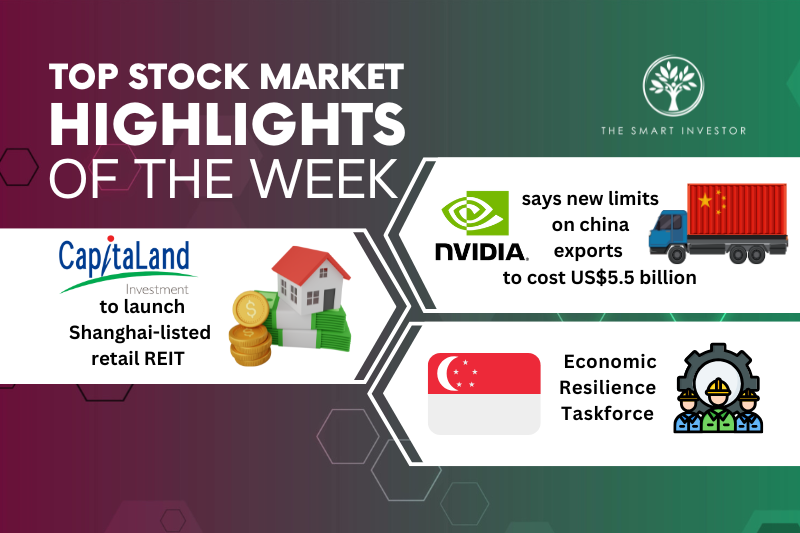Welcome to this week’s edition of top stock market highlights.
Nvidia (NASDAQ: NVDA)
Nvidia was informed by the US government that its H20 chip would require a licence “for the foreseeable future” before it can be exported to China .
This new restriction came as the Trump administration seems intent on escalating its trade war with China.
It will also interfere with Nvidia’s latest product line, which was explicitly designed to comply with previous restrictions.
Government officials said that this ruling will prevent the H20 from being used in, or diverted to, a supercomputer in China.
As a result, Nvidia will book around US$5.5 billion in write-downs because of the new ruling during its first quarter of fiscal 2026 results.
The H20 chip is a scaled-down product that’s designed to not be too powerful, and is better suited for the inference stage for artificial intelligence (AI) – or the point where the model recognises patterns and draws conclusions.
However, even this basic functionality is now perceived to be too risky to export to China.
Nvidia is unhappy with this restriction and believes that further restrictions may spur China to make itself independent of American companies, where the country will develop its technology in-house.
This write-down also implies that Nvidia may miss out on its revenue guidance for the year.
Meanwhile, Nvidia has also pledged to build up to US$500 billion worth of AI infrastructure in the US over the next four years.
It remains to be seen if the Trump administration is satisfied with the latest curb, or if Nvidia could suffer more restrictions in due course.
CapitaLand Investment Limited (SGX: 9CI)
CapitaLand Investment Limited, or CLI, looks set to be the first Singaporean company to list a Chinese retail REIT on the Shanghai Stock Exchange.
CLI plans to list CapitaLand Commercial C-REIT (CLCR), which will increase the funds under management (FUM) of CLI’s listed funds platform.
CLCR will invest in operating retail assets in China, which should benefit from the Chinese government’s stimulus policies designed to spur domestic consumption.
The new REIT will own two starting assets – CapitaMall SKY+ in Guangzhou and CapitaMall Yuhuating in Changsha.
These two properties have a total gross floor area of 168,405 square metres and are valued at RMB 2.8 billion.
Their aggregate committed occupancy stood at 97%.
CapitaMall SKY+ is jointly owned currently by both CLI and CapitaLand Development (CLD), while CapitaMall Yuhuating is owned by CapitaLand China Trust (SGX: AU8U), or CLCT.
After the REIT is listed, CLI, CLCT and CLD will still collectively own a 20% stake in CLCR.
CLI will continue to operate both assets post-launch and has a potential pipeline of 43 retail properties across 18 Chinese cities that can be injected into both CLCR and CLCT.
The move to spin off CLCR should help boost CLI’s recurring fee income and FUM and lighten its balance sheet further.
Singapore Economic Resilience Taskforce
The Singapore Economic Resilience Taskforce, or SERT, held a press conference recently to address the raft of tariffs imposed by US President Donald Trump.
Singapore’s GDP forecast was downgraded to between 0% to 2%, and Deputy Minister Gan Kim Yong cannot rule out the possibility of a recession this year.
SERT will comprise three workstreams to help businesses, especially SMEs (small, medium enterprises), navigate these challenges.
The first is for information sharing and sensemaking so that everyone is aware of the latest developments and how they impact businesses and workers.
The second involves immediate support to address the challenges faced by these two groups.
Budget 2025 has rolled out a comprehensive package, but this will be reviewed to determine if it is sufficient, and more support will be provided if necessary.
As for the third, the plan is to focus on longer-term strategic planning to help businesses and the economy transform and reposition in a new economic landscape.
Singapore Business Federation (SBF) vice-chairman Mark Lee said that SBF has established the Centre for the Future of Trade and Investment (CFOTI), which launched a national sentiment poll to capture business reaction and understand the support that businesses feel they need.
The results of this poll will be out in the next two to three weeks.
He advised businesses here to continue to innovate, strengthen their offerings, and tap into Singapore’s free trade agreement (FTA) network to diversify their markets and suppliers.
Generative AI is reshaping the stock market, but not in the way most investors think. It’s not just about which companies are using AI. It’s about how they’re using it to unlock new revenue, dominate their markets, and quietly reshape the business world. Our latest FREE report “How GenAI is Reshaping the Stock Market” breaks the hype down, so you can invest with greater clarity and confidence. Click here to download your copy today.
Follow us on Facebook and Telegram for the latest investing news and analyses!
Disclosure: Royston Yang does not own shares in any of the companies mentioned.





